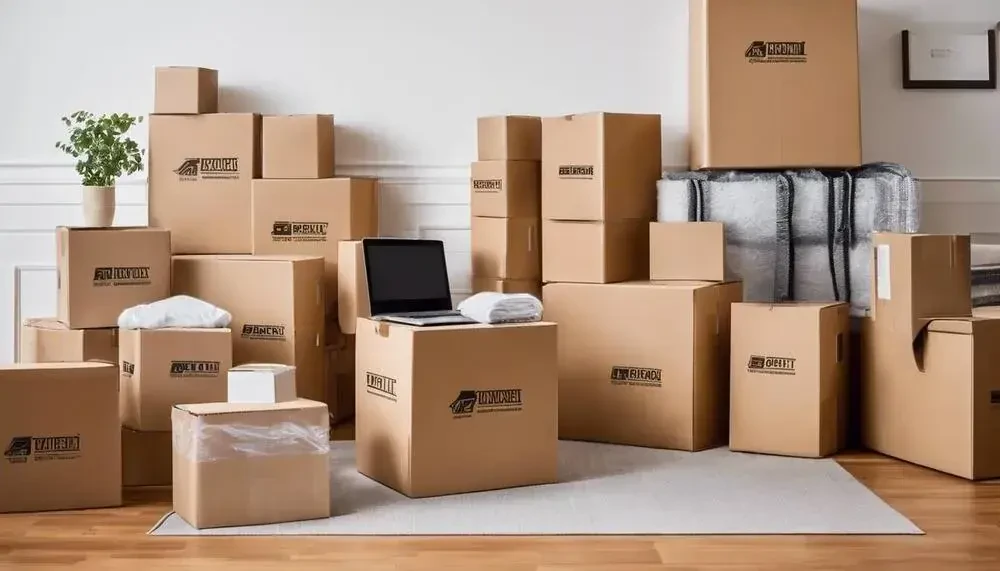Published by Chris Townsend
Last updated Jun, 27 2025

The average cost for movers in St. Paul, MN typically ranges from $5,567 to $9,576 per move.
Price Table for Moving Service
| Service Type | Basic Package | Premium Package | Deluxe Package |
|---|---|---|---|
| Packing | Included | Included | Included |
| Furniture Disassembly | Not Included | Included | Included |
| Loading | Included | Included | Included |
| Enclosed Transport | Not Included | Included | Included |
| Local Transport | Included | Included | Included |
| Insurance | Not Included | Included | Included |
| Delivery | Standard | Standard | Express |
| Storage Service | 7 Days Included | 12 days Included | 15 days Included |
| Price | $5,000 | $7,500 | $10,000 |
Cost of Movers in St. Paul: Get An Estimate Today for Your Move
Shifting homes can be a stressful ordeal, especially when you're unsure about the costs involved. If you're planning to move within or to St. Paul, understanding the cost of movers is vital to ensure a smooth relocation. With prices varying due to many factors such as distance, quantity of items, and time of year, it's often difficult to get a clear picture of what you'll need to budget for your move. This blog post aims to break that uncertainty by providing valuable insights into the costs involved in hiring professional movers in St. Paul. Read on and start your full-service moving journey with confidence, armed with knowledge that will help you manage your budget effectively while ensuring a hassle-free relocation!
The cost of movers in St. Paul can vary depending on several factors such as the size and distance of the move, the number of belongings, additional services required, and the specific moving company you choose. To get an accurate estimate, it is recommended to fill out our moving estimate form or contact our provided phone number so that our team can assist you in determining the cost based on your specific requirements.
Factors Affecting Moving Costs in St. Paul

When planning a commercial move in St. Paul, it's crucial to understand the factors that can influence the overall cost of your relocation. By considering these factors ahead of time, you can make informed decisions and better manage your budget. Some of the key aspects that affect moving costs in St. Paul include:
Imagine you're planning to move from a small apartment with minimal furniture to a large house with multiple bedrooms and extensive belongings. The difference in size and complexity between these two moves will impact the costs involved.
- Distance: The distance between your current location and your new home plays a significant role in determining moving costs. Whether you're relocating within the city or across the country, longer distances generally require more resources, such as fuel and labor.
- Volume of Belongings: The amount of items you have to move influences both the amount of packing material required and the size of the moving truck needed. More possessions often result in higher transportation costs.
- Specialty Items: If you own large or delicate items, such as pianos, antiques, or artwork, they may need additional care and specialized handling during the move. This could lead to extra fees or charges for equipment or expertise.
- Accessibility: Factors like stairs, narrow hallways, or limited parking at either your current or new location can affect the difficulty and time required for movers to complete the job. These challenges may contribute to increased labor costs.
- Timing: Peak moving seasons, weekends, and holidays are typically busier times for moving companies. As demand increases during these periods, so does the cost of hiring professional movers.
Now that we've explored some key factors affecting moving costs in St. Paul let's zoom in on one crucial aspect: Type of Move: Residential vs Business.

Type of Move: Residential vs Business
The type of cheap move, whether it is residential or business, can significantly impact the moving costs in St. Paul.
When relocating your home, factors such as the size of your house, number of rooms, and the amount of furniture and belongings to be moved will influence the overall cost. Additional services like packing and unpacking assistance may also be considered.
On the other hand, business moves involve unique considerations. Office equipment, furniture, and technology require specialized handling and careful disassembly/reassembly. The timing of the move may also play a role. If you need to minimize downtime for your business operations, extra coordination and planning may be required, leading to higher costs.
For example, moving a small apartment may require a smaller truck and fewer labor hours compared to relocating a large corporate office with multiple floors.
Understanding the differences between residential and business moves allows you to anticipate potential complexities and tailor your moving plan accordingly. Proper preparation and communication with your chosen moving company can help ensure an efficient and cost-effective experience.
- The type of move, whether it is residential or business, can greatly impact the overall cost of moving in St. Paul. Factors such as the size of your house or office, number of rooms, and amount of furniture and belongings will influence the expenses. Additional services like packing and unpacking assistance may also be considered for residential moves. Business moves come with their own set of considerations, as office equipment and technology require specialized handling. The timing of the move may also affect costs, especially if minimizing downtime is essential for business operations. Being aware of these differences allows you to plan accordingly and communicate effectively with your chosen moving company for a smooth and cost-effective experience.

Labor Rates and Equipment Usage
When it comes to the cost of hiring movers in St. Paul, labor rates and equipment usage play a significant role. The amount of physical labor required for your move will affect the overall cost. Movers typically charge an hourly rate based on the number of movers needed and the complexity of the job. For example, if you have a large house with multiple rooms or heavy furniture that requires extra manpower, it may increase the labor costs. Additionally, certain pieces of equipment such as dollies, ramps, and moving blankets may be necessary to ensure a safe and efficient move. These equipment rentals may also factor into the total cost. Providing accurate information about your moving needs can help you obtain a more precise estimate for labor rates and equipment usage.
For instance, let's say you are moving from a one-bedroom apartment with minimal furniture. In this case, you might only need two movers for a few hours, resulting in lower labor costs compared to someone moving from a four-bedroom house with bulky items like pianos or large appliances. The complexity and size of your move will dictate the required labor and equipment, influencing the overall cost.

Material and Transportation Expenses
While contemplating your move in St. Paul, it is important to consider the additional expenses associated with materials and transportation. Packing supplies such as boxes, bubble wrap, tape, and packing paper are essential for ensuring the safety of your belongings during transit. Depending on the volume of your possessions and how many items require specialized packaging, these material expenses can add up.
Transportation costs encompass various factors such as fuel charges, mileage, tolls, and any additional fees for renting trucks or vehicles needed for the move. It is essential to provide accurate details about your relocation distance to obtain an estimate that reflects these transportation expenses accurately.
Let's consider an example where you are moving locally within St. Paul. If your new home is only a few miles away, the transportation costs may be relatively lower compared to someone relocating from another state. However, if you are moving long distance or internationally, these expenses will likely increase due to the longer travel distance and potential logistics involved.
Now that we have covered labor rates and equipment usage as well as material and transportation expenses, let's dive into estimating your packing supplies budget to ensure a comprehensive understanding of the cost of movers in St. Paul.
- According to American Moving and Storage Association, the average cost for a local move within St. Paul was estimated to be around $2,300 in 2020.
- For long-distance moves, an average price reported by the same association was approximately $4,500.
- A study published by MoveBuddha in 2021 highlights that pricing depends on factors such as the size of your home, distance of the move, and time taken - with St. Paul residents paying almost 20% less for small moves compared to large ones.

Estimating Packing Supplies Budget
When planning a move, it is crucial to estimate your packing supplies budget accurately. Packing supplies include boxes, tape, packing paper, bubble wrap, and other materials necessary to protect your belongings during transit. The costs can add up quickly if you have a large inventory or fragile items that require extra care.
To estimate your packing supplies budget, start by taking an inventory of your belongings and determining the number of boxes you will need. Consider the size and quantity of items in each room to get an idea of how many boxes you should purchase. It's always better to have more boxes than you think you'll need to avoid last-minute scrambling.
Additionally, factor in the cost of packing paper, bubble wrap, and tape. These materials provide essential cushioning and protection for delicate items. Depending on the size of your move and the fragility of your belongings, you may need more packing paper and bubble wrap than anticipated.
Remember to shop around for the best prices on packing supplies. Check with local moving supply stores or consider purchasing used boxes from online platforms where people often give them away for free. By being resourceful and proactive in estimating your packing supplies budget, you can save money without compromising on the safety of your belongings.
Local vs. Long-distance Travel Charges

Whether you are moving locally within St. Paul or embarking on a long-distance relocation, understanding the difference in travel charges is essential for estimating your moving costs accurately.
Local moves typically involve shorter distances within the same city or nearby areas. The charges for local moves are usually based on an hourly rate that includes the time it takes for movers to drive from their facility to your origin location, load and unload your items, and return back to their facility. Additional factors such as the number of movers required and any specialized services needed (e.g., piano moving) may also influence the final cost.
On the other hand, long-distance moves involve greater distances and often require transportation of your belongings across state lines or even internationally. The charges for long-distance moves are calculated based on the weight of your items and the distance they will travel. Movers typically provide a rate per pound or a rate per cubic foot, depending on their pricing structure. It's important to note that additional services like packing, storage, or insurance coverage may also affect the final cost.
When comparing local and long-distance travel charges, keep in mind that long-distance moves generally have a higher base cost due to the nature of the logistics involved. However, it's crucial to obtain personalized quotes from reputable moving companies to get an accurate idea of the costs specific to your move.

Identifying Quality Movers in St. Paul
When planning a move in St. Paul, it is essential to find reputable and reliable movers who will handle your belongings with care. So, what are the key factors to consider when identifying quality movers in St. Paul?
Firstly, check if the moving company is properly licensed and insured. This ensures that they meet the necessary legal requirements and gives you peace of mind knowing that your belongings are protected during transit.
For instance, imagine you're moving from Lowertown to Cathedral Hill in St. Paul. Conducting thorough research and reading reviews online can help you identify moving companies with a positive reputation and track record of providing excellent service in the area.
Additionally, consider the company's experience and expertise. A moving company that has been operating for several years is likely to have the knowledge and skills required to handle your move efficiently.
It's also wise to inquire about their services. Do they offer packing and unpacking assistance? Will they provide all the necessary packing materials? Having a clear understanding of what services are included will enable you to make an informed decision.
Lastly, don't forget to ask for references or testimonials from past customers. Hearing about other people's experiences can give you valuable insights into the level of service provided by the moving company.
After identifying quality movers in St. Paul, let's explore the procedures for getting a reliable estimate to help you plan your move effectively.

Procedures for Getting a Reliable Estimate
Getting an accurate estimate is crucial when budgeting for your move. To ensure you receive a reliable estimate from your chosen moving company in St. Paul, follow these procedures:
- Contact the Moving Company: Reach out to different moving companies and provide them with detailed information about your move, including pick-up and drop-off locations, the size of your home, and any additional services you may require.
- Schedule an In-Home or Virtual Survey: Request a survey of your belongings to be conducted either in-person or through a virtual platform. This allows the moving company to assess the volume and weight of your items accurately, ensuring a more precise estimate.
- Be Transparent About Your Needs: Communicate all the details of your move, including any specialized items, such as antiques or delicate electronics. Being transparent about your requirements will help the moving company provide a comprehensive estimate.
- Ask for a Written Estimate: Once the assessment is complete, request a written estimate from each moving company you've contacted. Review these estimates carefully, paying attention to any additional charges or services mentioned.
- Compare Estimates: Compare the estimates provided by different moving companies, taking into account factors such as price, services offered, and their reputation. Remember that the lowest price may not always guarantee the best quality service.
By following these procedures, you can be confident in obtaining accurate estimates from reliable movers in St. Paul, allowing you to plan your move more effectively.



